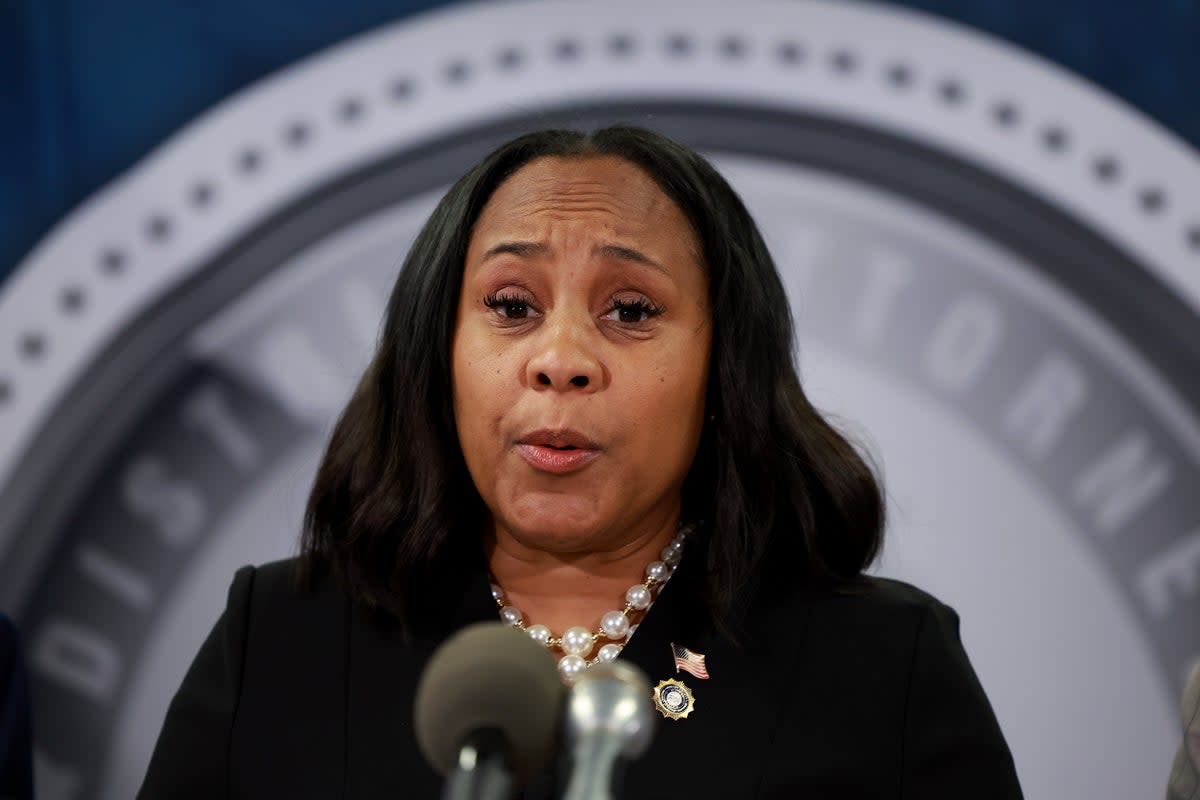What is Georgia’s RICO law? Why prosecutors brought sweeping racketeering charges against Trump

The Georgia prosecutor who has overseen several high-profile cases relying on a state statute typically associated with organized crime has brought her biggest case yet against Donald Trump and more than a dozen others.
Fulton County District Attorney Fani Willis, whose office has been investigating the former president’s attempts to subvert 2020 presidential election results in the state, has led career indictments against more than two dozen people connected to a sprawling Atlanta hip-hop empire, 38 alleged gang members, and 25 educators accused of cheating Atlanta’s public school system.
Those prosecutions relied on the state’s anti-racketeering RICO statute. A former president and the current frontrunner for the 2024 Republican presidential nomination – as well as a former White House chief of staff, several of his attorneys and state officials – are joining the list.
Her office has been investigating alleged efforts from Mr Trump and his allies to overturn election results in the state for more than two years, adding to a long list of criminal investigations and other legal consequences facing the former president, now facing a massive criminal conspiracy case along with 18 co-defendants.
On 14 August, a Georgia grand jury reached an indictment in the state investigation – separate from federal charges against Mr Trump alleging three criminal conspiracies and obstruction stemming from 2020 election subversion.
The indictment charges Mr Trump as well as Mark Meadows and attorneys Rudy Giuliani, John Eastman, Kenneth Cheseboro and Jenna Ellis, among others, in connection with an alleged criminal enterprise to unlawfully reject the outcome of the state’s election results against the will of Georgia voters.
What is a RICO law?
A federal Racketeer Influenced and Corrupt Organizations Act was established in 1970 initially to prosecute the Mafia and organized crime, but the law has been broadly applied to combat corruption, conspiracy, fraud and a number of offences under an umbrella of coordinated criminal activity.
In 1989, the US Supreme Court noted that the law was drafted “broadly enough to encompass a wide range of criminal activity, taking many different forms and likely to attract a broad array of perpetrators.”
Following the law’s effect, more than two dozen states began to adopt their own set of statutes under similar schemes. Typically, such laws allow prosecutors to charge multiple people who commit separate crimes while engaged in a common enterprise.
Georgia’s nearly 40-year-old RICO provisions are considered more expansive than federal law.
The state makes it a crime to join, control, or conspire with an “enterprise” through a “pattern of racketeering activity” – but a scheme does not have to be successful for prosecutors to seek charges.
Prosecutors must convince a jury beyond a reasonable doubt that at least two of those racketeering activities are related. In this case, those crimes would have been committed in an attempt to undermine and overturn Georgia’s lawful election results.
“It allows a prosecutor to go after the head of an organization, loosely defined, without having to prove that that head directly engaged in a conspiracy or any acts that violated state law,” John Marshall Law School professor Michael Mears told The New York Times. “If you are a prosecutor, it’s a gold mine. If you are a defense attorney, it’s a nightmare.”
How does it apply in the 2020 election case?
The indictment alleges 40 separate crimes and 161 different acts connected to an alleged criminal conspiracy.
All 19 defendants in the indictment are charged under the RICO statute. Mr Trump is also charged with 12 other crimes.
Count 28, for example, addresses Mr Trump’s phone call with his former chief of staff and now co-defendant Mark Meadows to Georgia’s Secretary of State Brad Raffensperger to “find 11,780 votes, which is one more than we have” to win Georgia.
That charge is for “solicitation of violation of oath by public officer.”
Several counts address the breach of voting machine software and a conspiracy to illegally access voting machines, some of which was removed – “including ballot images, voting equipment software, and personal voter information” – and then “distributed to other members of the enterprise, including members in other states.”
Those charges include conspiracy to commit computer theft, conspiracy to commit computer trespass, and conspiracy to commit computer invasion of privacy.
“The racketeering statute does not look simply at a single crime, it tries to look at the big picture of view,” Emory University law professor Morgan Cloud told CBS News. “It has to be not just one separate isolated event, but a series of interrelated actions.”
What other RICO cases has Fani Willis prosecuted?
During a news conference announcing an indictment against more than two dozen alleged gang members last year, Ms Willis said: “I’m a fan of RICO.”
Last year, her office charged rappers Young Thug and Gunna and 26 others in a 65-count RICO case following an 88-page grand-jury indictment characterising their YSL group as a “criminal street gang” behind 182 instances of gang activity and criminal conspiracies.
Her office also led RICO indictments against 12 alleged members of the Bloods gang, including the rapper YFN Lucci, and 26 alleged members of the Drug Rich gang, connected to a gang string of robberies and home invasions across Atlanta.
In a controversial case from 2014, she served as the lead prosecutor in a RICO case involving 35 Atlanta public school educators tied to an infamous cheating scandal, ultimately resulting in racketeering convictions against 11 of 12 people accused of manipulating students’ standardised test scores.
Following RICO charges against alleged members of the Drug Rich gang, accused of a series of high-profile robberies and shootings involving Atlanta’s wealthy, Ms Willis told reporters: “If you thought Fulton was a good county to bring your crime to, to bring your violence to, you are wrong and you are going to suffer consequences.”
